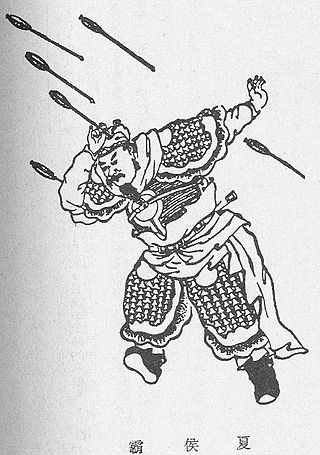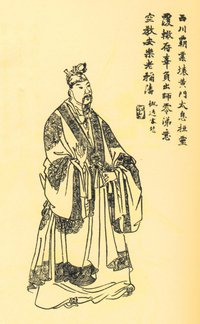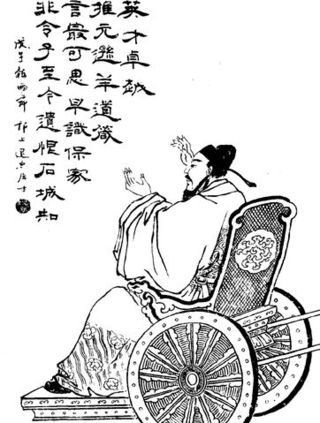Related Research Articles

Jiang Wei, courtesy name Boyue, was a Chinese military general and politician of the state of Shu Han during the Three Kingdoms period of China. Born in Ji County, Jiang Wei started his career as a military officer in his native Tianshui Commandery, which was a territory of Wei. In 228, when Wei's rival state Shu launched an invasion led by Zhuge Liang, Jiang Wei was distrusted by Ma Zun, then administrator of Tianshui Commandery. As such, Jiang Wei had to defect to Shu. Zhuge Liang, the Imperial Chancellor and regent of Shu, highly regarded Jiang Wei and appointed him as a general in Shu. After Zhuge Liang's death in 234, Jiang Wei continued serving as a military commander during the regencies Jiang Wan and Fei Yi, eventually rising to the highest military rank of General-In-Chief (大將軍) after Fei Yi's death in 253. Between 240 and 262, he continued Zhuge Liang's legacy of waging war against Wei by leading another 11 military campaigns. However, Jiang Wei's campaigns were relatively constrained in terms of both scale and duration due to Shu's limited resources and inadequate food supplies, as well as internal political faultlines. In 263, when Wei launched a massive invasion of Shu, Jiang Wei led Shu forces to resist the invaders at Tazhong, Yinping and Jiange, himself defending Jiange which was under Zhong Hui's attack. While Jiang Wei managed to temporarily stall Wei's main force led by Zhong Hui, Deng Ai, another military commander of Wei, took a shortcut via Yinping and showed up at Chengdu unexpectedly. Liu Shan surrendered to Deng Ai without putting up resistance and ordered Jiang Wei to surrender to the Wei general Zhong Hui; this event marked the end of Shu's existence. In the following year, Jiang Wei instigated Zhong Hui to launch a rebellion in Chengdu against the Wei regent Sima Zhao and hoped to use the opportunity to gain military power and restore Shu. However, some of Zhong Hui's officers were unwilling to participate in the rebellion and started a mutiny, killing Jiang Wei and Zhong Hui.

Wei was one of the major dynastic states in China during the Three Kingdoms period. The state was established in 220 by Cao Pi based upon the foundations laid by his father Cao Cao during the end of the Han dynasty. Its capital was initially located at Xuchang, and was later moved to Luoyang.

Xiahou Ba, courtesy name Zhongquan, was a Chinese military general of the state of Cao Wei in the Three Kingdoms period of China. He was the second son of Xiahou Yuan, a prominent general who served under Cao Cao, the warlord who laid the foundation for the state of Cao Wei. Around 249, Xiahou Ba defected to Wei's rival state, Shu Han, after the regent Sima Yi seized power in a coup d'état. He died sometime between 255 and 259.

Liu Shan, courtesy name Gongsi, was the second and last emperor of the state of Shu Han during the Three Kingdoms period. As he ascended the throne at the age of 16, Liu Shan was entrusted to the care of the Chancellor Zhuge Liang and Imperial Secretariat Li Yan. His reign of 40 years was the longest of all emperors in the Three Kingdoms era. During Liu Shan's reign, many campaigns were led against the rival state of Cao Wei, primarily by Zhuge Liang and his successor Jiang Wei, but to little avail, due to their drastic mismatch in terms of population and geographic extent. Liu Shan eventually surrendered to Wei in 263 after Deng Ai led a surprise attack on the Shu capital Chengdu. He was quickly relocated to the Wei capital at Luoyang, and enfeoffed as "Duke Anle". There he enjoyed his last years peacefully before dying in 271, most probably of natural causes.

Deng Ai, courtesy name Shizai, was a Chinese military general and politician of the state of Wei during the Three Kingdoms period of China. He is best known for his pivotal role in the Wei conquest of its rival state, Shu, in 263. He was described as a very loyal subject who made great contributions to Wei, but was also noted for his arrogance and audacity, which led to his downfall and death.

Zhuge Liang's Northern Expeditions were a series of five military campaigns launched by the state of Shu Han against the rival state of Cao Wei from 228 to 234 during the Three Kingdoms period in China. All five expeditions were led by Zhuge Liang, the Imperial Chancellor and regent of Shu. Although they proved unsuccessful and ended up as a stalemate, the expeditions have become some of the best known conflicts of the Three Kingdoms period and one of the few battles during it where each side fought against each other with hundreds of thousands of troops, as opposed to other battles where one side had a huge numerical advantage.

Zhong Hui, courtesy name Shiji, was a Chinese calligrapher, essayist, military general, and politician of the state of Cao Wei during the Three Kingdoms period of China. He was the younger son of Zhang Changpu with Zhong Yao, who served as the Grand Tutor in the Wei imperial court. He was already known for being insightful, intelligent and knowledgeable since he was young. Zhong Hui rose to prominence in the 250s when he became a close aide to Sima Zhao, the regent and de facto ruler of Wei. He advised Sima Zhao on how to deal with the Third Rebellion in Shouchun from 257 to 258 and was highly regarded by the latter. With Sima Zhao's help, Zhong Hui steadily moved up the ranks and became one of the key figures in the Wei government.

Xun You, courtesy name Gongda, was a statesman who lived during the late Eastern Han dynasty of China and served as an adviser to the warlord Cao Cao. Born in the influential Xun family of Yingchuan Commandery, Xun You was recruited into the civil service by the general He Jin. When the warlord Dong Zhuo hijacked and controlled the Han central government between 189 and 192, Xun You plotted with four others to assassinate him but was discovered and imprisoned. Following his release after Dong Zhuo's death, he wanted to serve as the Administrator of Shu Commandery but eventually settled as an official in Jing Province.

Zhuge Dan, courtesy name Gongxiu, was a Chinese military general and politician of the state of Cao Wei during the Three Kingdoms period of China. When he held key military appointments throughout his middle to late career, he was involved in all of the three rebellions which broke out in Shouchun between 251 and 258. During the second rebellion, he actively assisted the Wei regent Sima Shi in suppressing the revolt. After the rebellion, the Wei government put him in charge of Shouchun. As the Sima clan became more powerful and established themselves as the de facto rulers of Wei, Zhuge Dan feared that he would end up slain like Wang Ling and Guanqiu Jian – the leaders of the first two rebellions – so he started the third rebellion against Sima Zhao, who succeeded Sima Shi as regent of Wei in 255. Although he received some support from Wei's rival state Eastern Wu, his rebellion was eventually suppressed by Wei imperial forces and he met his end at the hands of Hu Fen, a military officer under Sima Zhao.

Zhuge Ke, courtesy name Yuanxun (元逊), was a Chinese military general and politician of the state of Eastern Wu during the Three Kingdoms period of China. He was the eldest son of Zhuge Jin, a military general who served under Wu's founding emperor, Sun Quan. After Sun Quan's death in 252, Zhuge Ke served as regent for Sun Quan's son and successor, Sun Liang, but the regency proved to be militarily disastrous due to Zhuge Ke's aggressive foreign policy towards Wu's rival state, Cao Wei. In 253, he was ousted from power in a coup d'état and killed along with his family.
Guo Huai, courtesy name Boji, was a Chinese military general of the state of Cao Wei during the Three Kingdoms period of China. He started his career towards the end of the Eastern Han dynasty under the warlord Cao Cao as a subordinate of Cao Cao's generals Xiahou Yuan and Zhang He. During the Three Kingdoms period, he served in Wei, the state established by Cao Cao's son Cao Pi, and lived through the reigns of four Wei emperors. From the 220s until his death in 255, he governed and defended Wei's western borders in Yong and Liang provinces. During this time, he resisted multiple invasions by Wei's rival state, Shu Han, and quelled some rebellions by local Qiang, Di and other non-Han Chinese tribes.
Wang Su (195–256), courtesy name Ziyong, was an official and Confucian scholar of the state of Cao Wei during the Three Kingdoms period of China. He was a son of Wang Lang. When Guanqiu Jian started a rebellion in Shouchun, Wang Su advised Sima Shi to lower the rebels' morale by treating their families with respect. Following that, Wang Su entreated Cao Mao to allow Sima Zhao to succeed Sima Shi as regent of Wei.
Sun Kuang, courtesy name Jizuo, was a younger brother of Sun Quan, a Chinese warlord who lived during the late Eastern Han dynasty and became the founding emperor of the state of Eastern Wu in the Three Kingdoms period.
Jiang Wei's Northern Expeditions refer to a series of eleven military campaigns launched by the state of Shu Han against its rival state, Cao Wei, between 240 and 262 CE during the Three Kingdoms period in China. The campaigns were led by Jiang Wei, a prominent Shu general. Unlike the previous Northern campaigns led by Zhuge Liang, which added Wudu and Yinping commanderies to Shu Han state territories, Jiang Wei's campaigns ended up being unpopular in both the military and civil circles in Shu. Also unlike Zhuge Liang's campaigns which often featured 60,000 to sometimes even 100,000 Shu Troops, Jiang Wei's were often much smaller rarely exceeding 30,000 even after the death of Fei Yi, where Jiang Wei assumed control of the military. The Zhuge Liang campaigns did suffer from logistical and supply issues for their large army. Zhuge's successor Jiang Wan, believed that it was the Hanzhong's mountainous terrain itself that were to blame for the campaigns failures and attempted to switch the route through the Han river. Fei Yi, who succeeded Jiang Wan, agreed, and never allowed any large campaigns to be launched by Hanzhong. Jiang Wei however overlooked these concerns and used Hanzhong as his home base as Zhuge Liang did.
The Incident at the Gaoping Tombs was a coup d'état that took place on 5 February 249 in the state of Cao Wei during the Three Kingdoms period (220–280) of China. The parties involved were Sima Yi and Cao Shuang, who were both regents for the Cao Wei emperor Cao Fang, who was then about 17 years old. On that day, while Cao Shuang and his brothers accompanied the emperor on a visit to the Gaoping tombs, Sima Yi staged a coup d'état; taking control of the capital city of Luoyang and issuing a memorial which listed out the various crimes Cao Shuang had committed. Cao Shuang surrendered and gave up his powers after further receiving reassurance that he and his family would be spared, thinking that he could still live a life in luxury. Shortly thereafter, Cao Shuang, his brothers, and his supporters were charged with treason and executed along with their families on 9 February. The coup d'état increased the Sima family's influence and paved the way for the eventual replacement of the Cao Wei regime by the Sima family's Jin dynasty in February 266.
Deng Yang, courtesy name Xuanmao, was an official of the state of Cao Wei in the Three Kingdoms period of China.
Jiang Ji, courtesy name Zitong, was an official and military general of the state of Cao Wei during the Three Kingdoms period of China. Born in the late Eastern Han dynasty, Jiang Ji started his career as a low-level official in his native Yang Province before becoming a subordinate of Cao Cao, the warlord who controlled the central government towards the end of the Eastern Han dynasty. After the end of the Eastern Han dynasty, he served in the state of Cao Wei through the reigns of the first three emperors – Cao Pi, Cao Rui and Cao Fang – and held various appointments in the military before rising to Grand Commandant, one of the top positions in the central government. During his service in Wei, he was known for being candid in giving advice to the emperor on various issues, including consolidating power, halting labour-intensive construction projects, and officials' abuses of power. In February 249, he joined the regent Sima Yi in staging a successful coup d'état against his co-regent Cao Shuang, but died from illness a few months later.
Sima Yi (179–251) was a general, politician and regent of the state of Cao Wei (220–266) in the Three Kingdoms period (220–280) in China. Two of his sons, Sima Shi (208–255) and Sima Zhao (211–265), rose to power in the 250s and consecutively served as regents throughout the reigns of the last three Wei emperors. After Sima Zhao died in September 265, his son Sima Yan (236–290) forced the last Wei ruler, Cao Huan (246–303), to abdicate the throne in his favour in February 266, ending the Wei regime and establishing the Jin dynasty (266–420). This article contains the family trees of Sima Yi, his brothers, and their descendants up to Sima Yan's generation. For more details on the family trees of the Jin emperors, see Chinese emperors family tree (early)#Jin Dynasty and Chu.
Xun Yi, courtesy name Jingqian, was a Chinese politician of the state of Cao Wei in the Three Kingdoms period of China. After the fall of Wei, he continued serving under the Jin dynasty, which replaced Wei in February 266. He was the sixth son of Xun Yu.
Sima Gan, courtesy name Ziliang (子良), was the youngest son of Sima Yi and his main wife Zhang Chunhua, and a younger brother of Sima Shi and Sima Zhao. Sima Yi, Sima Shi and Sima Zhao eventually became regents of the Cao Wei state during the Three Kingdoms era.
References
- ↑ (Although Chen Tai's birth year was not recorded, he should be at least in his early 20s when he obtained his first official position during the Qing'long era (233-237) of Cao Rui's reign. Thus, his birth year should be in the 210s or before.
- 1 2 (景元元年薨,追贈司空。謚曰穆侯。) Sanguozhi vol. 22.
- ↑ Chen Tai died soon after Cao Mao's death, which was on 2 June 260. Thus, Chen Tai's death date should be in mid- or late-June 260.
- ↑ (荀顗,字景倩,潁川人,魏太尉彧之第六子也。幼為姊婿陳群所賞。) Jin Shu vol. 39.
- ↑ (干寶晉紀曰:高貴鄉公之殺,司馬文王會朝臣謀其故。太常陳泰不至,使其舅荀顗召之。) Jin Ji annotation in Sanguozhi vol. 22.
- ↑ (正始中,...,为并州刺史,....) Sanguozhi, vol.22. Note that the original text recorded that Chen Tai's appointment as Inspector of Bing Province took place during the Zheng'shi era of Cao Fang's reign, with no exact year indicated. In addition, Chen Tai was recorded to have obtained his first official position during the Qing'long era of Cao Rui's reign.
- ↑ (帝召百僚谋其故,仆射陈泰不至。帝遣其舅荀𫖮舆致之,延于曲室,谓曰:“玄伯,天下其如我何?”泰曰:“惟腰斩贾充,微以谢天下。”帝曰:“卿更思其次。”泰曰:“但见其上。不见其次。”于是归罪成济而斩之。) Jin Shu, vol.02. Gan Bao's Jin Ji recorded a similar anecdote, which was used by Pei Songzhi in his annotations. (〈干宝《晋纪》曰:高贵乡公之杀,司马文王会朝臣谋其故。太常陈泰不至,使其舅荀𫖮召之。𫖮至,告以可否。泰曰:“世之论者,以泰方于舅,今舅不如泰也。”子弟内外咸共逼之,垂涕而入。王待之曲室,谓曰:“玄伯,卿何以处我?”对曰:“诛贾充以谢天下。”文王曰:“为我更思其次。”泰曰:“泰言惟有进于此,不知其次。”文王乃不更言。) Annotation from Gan Bao's Jin Ji in Sanguozhi, vol.22. Pei Songzhi pointed out that Chen Tai was not tai'chang (as recorded in Jin Ji) at the time. He also expressed skepticism at Sun Sheng's account in Wei Shi Chunqiu. (臣松之案本传,泰不为太常,未详干宝所由知之。孙盛改易泰言,虽为小胜。然检盛言诸所改易,皆非别有异闻,率更自以意制,多不如旧。凡记言之体,当使若出其口。辞胜而违实,固君子所不取,况复不胜而徒长虚妄哉?) Annotation by Pei Songzhi in Sanguozhi, vol.22.
- ↑ This account is per Wei Shi Chunqiu. (魏氏春秋曰:帝之崩也,太傅司马孚、尚书右仆射陈泰枕帝尸于股,号哭尽哀。时大将军入于禁中,泰见之悲恸,大将军亦对之泣,谓曰:“玄伯,其如我何?”泰曰:“独有斩贾充,少可以谢天下耳。”大将军久之曰:“卿更思其他。”泰曰:“岂可使泰复发后言。”遂呕血薨。) Wei Shi Chunqiu annotation in Sanguozhi, vol.22. The original Sanguozhi only recorded that Chen Tai died in the 1st year of the Jing'yuan era, without mentioning other details or his reaction to Cao Mao's death. The record in Han Jin Chun Qiu was that Chen Tai urged Sima Zhao to kill Jia Chong; when Zhao refused, Tai committed suicide when he returned to his residence. (《汉晋春秋》曰:“曹髦之薨,司马昭闻之,自投於地曰:‘天下谓我何?’於是召百官议其事。昭垂涕问陈泰曰:‘何以居我?’泰曰:“公光辅数世,功盖天下,谓当並迹古人,垂美於後,一旦有杀君之事,不亦惜乎!速斩贾充,犹可以自明也。’昭曰:‘公闾不可得杀也,卿更思餘计。’泰厉声曰:‘意唯有进於此耳,餘无足委者也。’归而自杀。”) Han Jin Chunqiu annotation in Shishuo Xinyu, vol.05.
- Chen, Shou (3rd century). Records of the Three Kingdoms (Sanguozhi).
- Fang, Xuanling (648). Book of Jin (Jin Shu).
- Pei, Songzhi (5th century). Annotations to Records of the Three Kingdoms (Sanguozhi zhu).